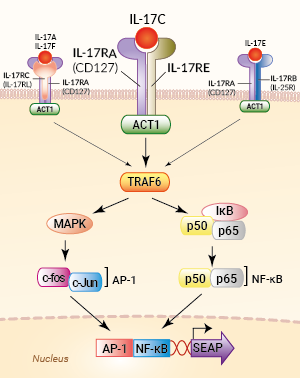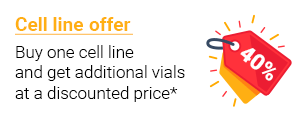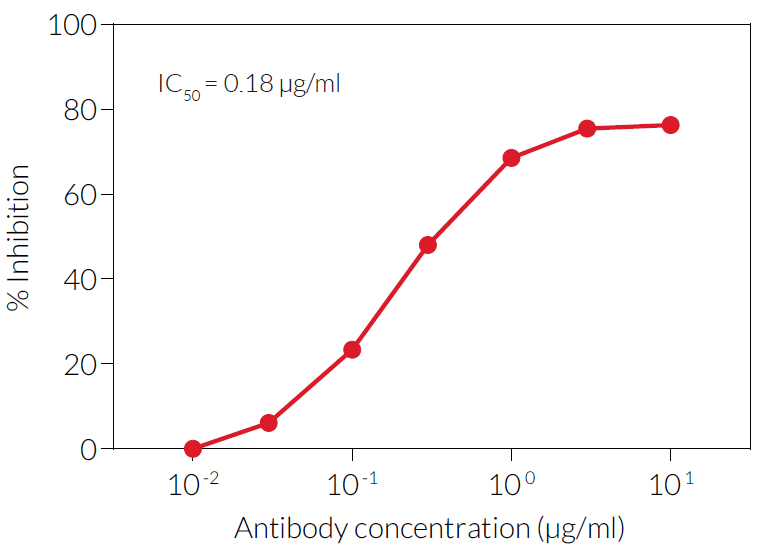IL-17C Reporter HEK 293 Cells
| Product | Unit size | Cat. code | Docs. | Qty. | Price | |
|---|---|---|---|---|---|---|
|
HEK-Blue™ IL-17C Cells Human & Mouse IL-17C Reporter Cells |
Show product |
3-7 x 10e6 cells |
hkb-il17c
|
|
||
|
HEK-Blue™ IL-17C vial Additional cell vial |
Show product |
3-7 x 10e6 cells |
hkb-il17c-av
|
Notification: Reference #hkb-il17c-av can only be ordered together with reference #hkb-il17c.
IL-17C Reporter Cells

Signaling pathway in HEK-Blue™ IL-17C cells
HEK-Blue™ IL-17C cells were engineered from the human embryonic kidney HEK293 cell line to detect bioactive human and murine interleukin-17C (IL-17C) by monitoring the activation of the NF-κB and AP-1 pathways. In addition, these cells can be used for screeningantibodies or small molecule inhibitors targeting the IL-17 pathway.
IL-17C is a pro‑inflammatory cytokine that promotes Th17 immunity to pathogens in the lungs, skin, and colon [1].
Cell line description
HEK-Blue™ IL-17C cells were generated by stable transfection with the genes encoding for the human IL-17C receptor (IL-17RA and IL-17RE chains), the ACT1 adaptor molecule, as well as an NF-κB- and AP-1-inducible secreted embryonic alkaline phosphatase (SEAP) reporter. The binding of IL-17C to its receptor triggers a signaling cascade leading to the activation of NF-κB/AP-1 and the subsequent production of SEAP. This can be readily assessed in the supernatant using QUANTI-Blue™ Solution, a SEAP detection reagent.
HEK-Blue™ IL-17C cells detect human (h) IL-17C and murine (m) IL-17C. Of note they also respond to h/mIL-17E (also known as IL-25), as well as hIL-17A. They display little to no response to hIL-17F and do not respond to mIL-17A nor mIL-17F (see figures). HEK-Blue™ IL-17C cells do not respond to hIL-17B nor hIL-17D (data not shown).
Key features
- Fully functional IL-17 signaling pathway
- Readily assessable NF-κB/AP-1-SEAP reporter activity
- Strong response to h/mIL-17C & h/mIL-17E
- Moderate response to hIL-17A
- Low to no response to mIL-17A & h/mIL-17F
Applications
- Detection and quantification of h/mIL-17C activity
- Detection and quantification of h/mIL-17E (IL-25) activity
- Screening of anti-IL-17 or anti-IL-17 receptor antibodies
- Screening and release assay of small molecule inhibitors of the IL-17 pathway
Reference:
1. Yamaguchi S. et al., 2018. The roles of IL-17C in T cell-dependent and -independent inflammatory diseases. Sci Rep. 8(1):15750.
Back to the topSpecifications
Antibiotic resistance: Blasticidin, Hygromycin, Zeocin®
Growth medium: DMEM, 4.5 g/l glucose, 2-4 mM L-glutamine, 10% (v/v) heat-inactivated fetal bovine serum, 100 U/ml penicillin, 100 μg/ml streptomycin, 100 μg/ml Normocin®
Specificity: human and mouse IL-17C & IL-17E (IL-25), and human IL-17A
Detection range:
- human & mouse IL-17C: 3 - 100 ng/ml
- human & mouse IL-17E (IL-25): 0.3 - 100 ng/ml
- human IL-17A: 10 - 100 ng/ml
Quality Control:
- SEAP reporter activity in response to IL-17 is validated using functional assays.
- The stability for 20 passages following thawing is confirmed.
- These cells are tested for mycoplasma contamination.
Contents
- 1 vial containing 3-7 x 106 cells
- 2 x 1 ml of HEK-Blue Selection (250X concentrate)
- 1 ml of Normocin® (50 mg/ml)
- 1 ml of QB reagent and 1 ml of QB buffer (sufficient to prepare 100 ml of QUANTI-Blue™ Solution, a SEAP detection reagent).
![]() Shipped on dry ice (Europe, USA, Canada and some areas in Asia)
Shipped on dry ice (Europe, USA, Canada and some areas in Asia)
Details
Interleukin 17 (IL-17) is a family of six closely related cytokines (IL-17A to IL-17F) which can have both pro-inflammatory and anti-inflammatory activities. IL-17C is a pro‑inflammatory cytokine that promotes Th17 immunity to pathogens in the lungs, skin, and colon [1].
IL-17 cytokines exert their biological activities following binding to heterodimeric receptors containing the ubiquitous IL-17RA chain and a second IL-17R (C, B or E) chain. IL-17A and IL-17F bind to the IL-17RA/IL-17RC receptor, IL-17C binds to the IL-17RA/IL-17RE receptor, and IL-17E binds to the IL-17RA/IL-17RB receptor [1, 2]. The activated heterodimeric receptor recruits the Act1 adaptor and induces the TNF receptor-associated factor 6 (TRAF6) ubiquitylation. This triggers a signaling cascade that results in NF-κB and AP-1 activation [3].
1. Yamaguchi S. et al., 2018. The roles of IL-17C in T cell-dependent and -independent inflammatory diseases. Sci Rep. 8(1):15750.
2. Gu C. et al., 2013. IL-17 family: cytokines, receptors and signaling. Cytokine. 64(2):477-85.
3. Pappu R. et al., 2011. The interleukin-17 cytokine family: critical players in host defence and inflammatory diseases. Immunology. 134(1): 8–16.












